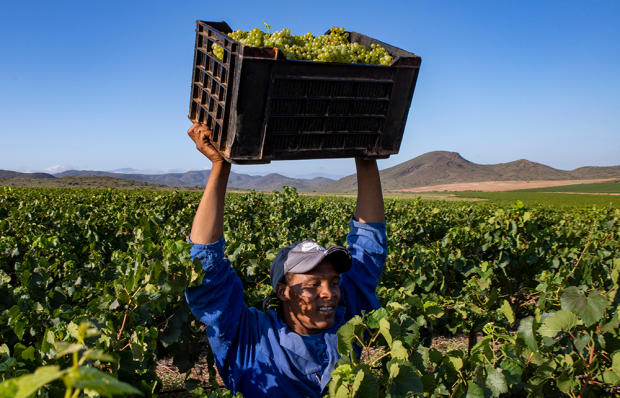‘The doors clap to, the pane is blind with showers / Pass me the bottle, old lad, there’s an end of summer.’ The paraphrase was justified, for the weather was doing its best to reinforce Housmanic gloom — although the scene through the windowpanes was best described in Scottish, not Shropshire. There is a Scots word, dreich. It may not be quite onomatopoeic, but roll it round your mouth and you will get the message. We certainly did.
Before us was a sodden lawn festooned with dead leaves. A few weeks ago, they would have been resplendent in dancing verdancy. More recently, it would have been a stately golden brown, the colour of mature Rieussec. They now looked like corpses on a muddy Flanders battlefield, so crushed that it was hard to believe they had ever been alive. This was as dreich as a wet Sunday in Arbroath.
Indoors, all was warmth: the only contact between glass and liquid occurred when the wine was poured. I was helping a friend to assess a couple of bottles, both en magnum. Were they ready? Worse still, were they over-ready? ‘Life, to be sure, is nothing much to lose,’ wrote poor old Housman. I am sure that even he would not have believed that of wine.
Fortunately, no pessimism was necessary. The 2008 Cissac was in perfect condition, as was the 2007 Perron. It comes from Lalande de Pomerol, a relatively unfashionable area of Bordeaux. It is also overshadowed by Perron la Fleur, which belongs to the Sichels of Palmer and d’Angludet. But it was in excellent shape, with both fruit and structure. There need be no hurry to drink it up. Vaut le detour; if there are any bargains in Bordeaux, Lalande de Pomerol may be the place to look.
My friend’s house is near Stockbridge, an increasingly important centre of gastronomy. This started with John Robinson’s, one of the best-known butchers in the country. Their pork sausages are as famous as they are unsurpassable. All their meat and game is first-rate and they are also good at fish and local cheeses. During the beef terror of the 1990s, the Robinsons were among the leading resistance figures. As they could not believe that any government would be so silly as to criminalise the roast beef of old England, they were eloquent in expressing their contempt. The Ministries of Prodnose and Jobs-worth felt sufficiently piqued to threaten prosecution, but wiser heads prevailed. England won.
Stockbridge also boasts at least one fine restaurant, the Greyhound. There is a thoughtful wine list: no bargains, but everything worth drinking. Opposite, there is a more informal gastropub, the Three Cups. The bar is full of proper people and gun-dogs, with talk about shooting and puppies. If you can get out after drinking as few as three cups, you deserve a prize for self-restraint.
As it was too wet for a walk, I picked up a novel, Barney Campbell’s Rain, and self-restraint became impossible. I did not put it down for hours. David Richards (as in General the Lord, recently Chief of the Defence Staff) says it is one of the best accounts he has ever read of what it is like to be a young officer in combat. A dear friend of mine describes me as a sentimental old git. My response to Rain did not refute her judgment. I cannot recommend it highly enough.
Himself a former soldier, Barney wants to be a Tory MP, and Rory Stewart has recently proved it is possible to combine writing and politics. Our author demonstrates moral depth, and that has not been true of all writer-politicians. Certainly not Disraeli, and there is a more recent example whose name escapes me. But Barney Campbell is an entirely different character and public life needs more of his qualities. Rain is a splendid first vintage from a man to watch.
Got something to add? Join the discussion and comment below.
Get 10 issues for just $10
Subscribe to The Spectator Australia today for the next 10 magazine issues, plus full online access, for just $10.
You might disagree with half of it, but you’ll enjoy reading all of it. Try your first month for free, then just $2 a week for the remainder of your first year.















Comments
Don't miss out
Join the conversation with other Spectator Australia readers. Subscribe to leave a comment.
SUBSCRIBEAlready a subscriber? Log in